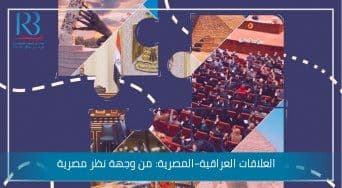 2021 / 20 / Jan
2021 / 20 / Jan
Iraqi-Egyptian Relations: Between the Past, Present and Future
Abdul Rahman Atef Abu Zaid
Egypt and Iraq have a close relationship throughout the ages, and the bonds of cooperation between the two countries have been strengthened more since their independence from the British occupation, and the support of each of the two countries for the other in crises of all kinds, resistance to occupation and colonialism, and advocacy of their common national issues, are indications indicating the existence of a strong organic link between the Arab peoples in general and the Iraqi people and the Egyptian people in particular, which, in addition to the crises that the Middle East is going through, calls for considering the form of the relationship between the two countries in the following stages and foreseeing its future .
In that context, we review in the following lines two main axes: the relationship between Egypt and Iraq in periods of crisis, and the future of Iraqi-Egyptian relations, as follows:
First - The relationship between Egypt and Iraq during periods of crisis:
One of the pivotal issues in the relationship between Egypt and Iraq is their support for each other during times of crisis. We find that Egypt provided strong material and diplomatic support to Iraq during its war with Iran that began in 1980. In 1983, Iraq called for the return of Egypt’s natural role among the Arab countries. In January 1984, Iraq succeeded in leading Arab efforts to restore Egypt’s membership in the League of Arab States, after it had lost it following the 197 peace agreement with Israel.
However, the Iraqi -Egyptian relations stopped in 1990 after Egypt joined the international coalition to remove Iraq from Kuwait, and despite this, relations witnessed an improvement in recent years, and with the development of the political process in Iraq, trust began to gradually strengthen the Egyptian political circles on the political situation in Iraq, as Egypt was among those who were strongly rejecting the Kurdistan referendum held in September 2017, and declared its refusal to take any unilateral measures that may increase the complexity of the situation, and in a way Iraq’s decision and nourishing the tension climate in the region.
After the first Gulf War, although Egypt remained wary of Saddam Hussein, it persisted in calling for the abolition of international sanctions on Iraq, and it also began to expand its trade relationship with the regime through the United Nations oil-for-food program, and by 2001 Egypt was among the first four largest trading partners for Iraq in that period.
As for Egypt's support for Iraq in its war against terrorism, Egyptian support for Iraq in combating terrorism is an integral part of the Egyptian strategy to combat terrorism, especially with regard to combating ISIS. This alignment is also based on the fact that Iraq is one of the important and essential parties in Egypt's Arab and Islamic milieu.
In addition, visits were exchanged between the officials of the two countries. The joint Iraqi-Egyptian committee, which was formed according to the Memorandum of Understanding for bilateral cooperation and strategic dialogue, held its first meeting in Cairo in November 2009, headed by the foreign ministers of the two countries and a large number of officials from the two countries. In 2010, Egypt opened two Egyptian consulates, the first in Erbil and the second in Basra, to be the first consular representation of an Arab country outside the capital, Baghdad. This is in addition to the meeting of Iraqi Prime Minister Haider al-Abadi, in January 2015, with President Abdel Fattah al-Sisi in Egypt, where President al-Sisi stressed the importance of strengthening joint efforts to combat the phenomenon of terrorism, appreciating al-Abadi’s efforts to reach agreement among all segments of the Iraqi people to confront the threat of ISIS and extremist groups.
In December 2020, the Egyptian Minister of Military Production, Muhammad Morsi, confirmed during his meeting with the Iraqi Minister of Industry and Minerals, Manhal Aziz, that the industrial, technological, technical and human capabilities available in the Egyptian military production companies for the Iraqi side were reviewed, as well as the products that they produce and the most prominent national projects that participate in their implementation.
Second - the future of Iraqi-Egyptian relations:
In this context, we explain the future of economic relations, then political and strategic relations between Egypt and Iraq, as follows:
A- The future of economic relations between Iraq and Egypt:
The oil-for-reconstruction agreement signed between Egypt and Iraq will enter into bilateral force once the constitutional procedures are completed, which stipulate that Egyptian companies carry out development projects in Iraq in return for the quantities of oil that Egypt imports. In this regard, Egyptian Prime Minister Mostafa Madbouly affirmed that Egypt is ready to provide any raw materials, supplies, and equipment to the Iraqi side, and he explained Egypt's keenness to bypass any routine procedures that may hinder the agreement, in addition to preparing a presidential directive to form a permanent follow-up committee for projects. Also, Iraqi Minister of Planning Khaled Battal confirmed that Iraq is keen to reach a specific list of development projects that will be implemented in cooperation with the Egyptian side.
After the signing of the Levant Agreement between Iraq, Egypt and Jordan on August 25, 2020, it is expected that an oil pipeline from Basra to Egyptian territory will be activated, extending through Jordanian territory, and Egypt and Jordan will receive discounts of up to $16 per barrel, while Iraq will import electricity from Egypt and Jordan, in addition to attracting investments between the three countries, and developing joint industrial areas through cooperation in the field of small and medium projects, in addition to expanding multiple strategic partnerships and forming a joint technical committee. Iraq can also refine its oil in Egyptian refineries. In a way that achieves double value to Egypt, and secures part of Iraqi oil exports away from Iranian harassment in the Strait of Hormuz, as the future passage of Iraqi and Gulf oil through Egypt will enhance the economy of those countries and help achieve strategic partnerships and weaken Iranian influence.
The current conditions in Iraq also provide an opportunity for Egypt and other Arab countries to find an entry point for them to participate in rebuilding Iraq. Arab legitimacy and Egyptian support is an important matter for any Iraqi government, and what is clear in this regard is Egypt's support for any legitimate government that enjoys a broad electoral and popular base in Iraq. Egypt had participated in commercial relations with Iraq following the agreement that took place between them in 2001 to establish a free trade zone, and progress was made in this aspect and important trade deals were concluded, and this practical experience can be developed in other fields to include all economic facilities to expand the base of common interests and mutual benefits, and to enhance economic integration and support development and progress between the two countries.
On October 15, 2020, Egypt and Iraq signed an agreement, a memorandum of understanding, and cooperation protocols to enhance bilateral Egyptian-Iraqi cooperation in areas such as judicial training, oil and water resources, the stock market, and environmental protection.
During a meeting with the Iraqi Minister of Industry and Minerals, Manhal Al-Khabbaz, the Egyptian Minister of Trade and Industry, Nevin Gamea, added that she had agreed with the Iraqi side to send a technical team from some ministries and relevant authorities to Baghdad in the coming period to identify the needs of the Iraqi market, expressing the keenness of a number of Egyptian businessmen to participate in reconstruction projects in Iraq, adding that the ministry seeks to provide all the required cadres to transfer Egyptian technology and expertise to Iraq, especially in the field of establishing industrial complexes. Stressing Iraq's interest in benefiting from Egypt's extensive experience in implementing legislative reforms related to economic laws in order to create an environment that encourages investment.
B- The future of political and strategic relations between Iraq and Egypt:
Since the formation of the regional system in the Middle East, Egypt and Iraq represent two cornerstones for achieving balance in the region. Although the two countries were exposed to some crises in the past, the two countries soon returned to play an important regional role, especially in light of their agreement on several common agendas and files such as achieving stability in the Arab region and the Palestinian cause, rejecting the Israeli presence, and opposing any infiltration of regional or international powers into local sovereignty.
In that context, the increasing Turkish influence in Iraq politically and economically, as well as the military presence in northern Iraq under the pretext of fighting terrorism, does not appeal to Egypt at all, as Cairo seeks to tighten the screws on Ankara in all fields. Another element affecting the bilateral relations of Egypt and Iraq is the Saudi-Emirati alliance and its support for the growing Iraqi-Egyptian relationship, with the aim of distancing Iraq from Iran and cutting off Turkey's foothold in Iraq.
It is worth noting that after the collapse of the regional balance between Iraq and Iran with the overthrow of Saddam Hussein's regime and its repercussions, the United States and many Arab countries have become in a position of constant concern about the growing power of Iran, and given the failure of American policy so far to find a solution to the crisis, the importance of the diplomatic activities of the Arab countries must be recognized and supported by America.

Abdul Rahman Atef Abu Zaid Abdul Rahman Atef Abu Zaid Abdul Rahman Atef Abu Zaid